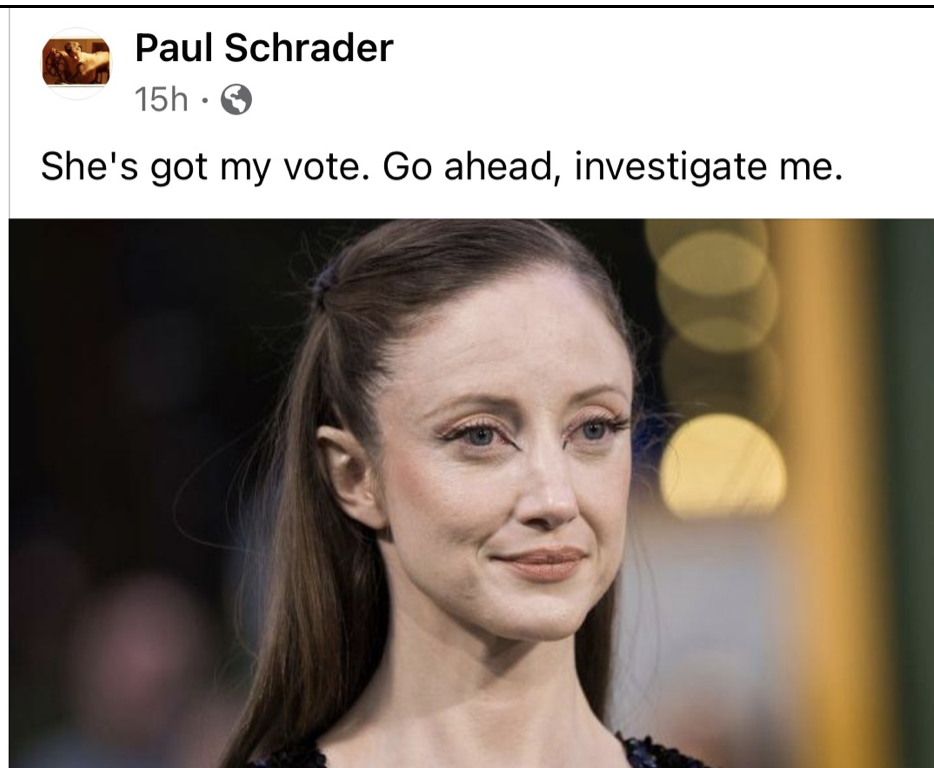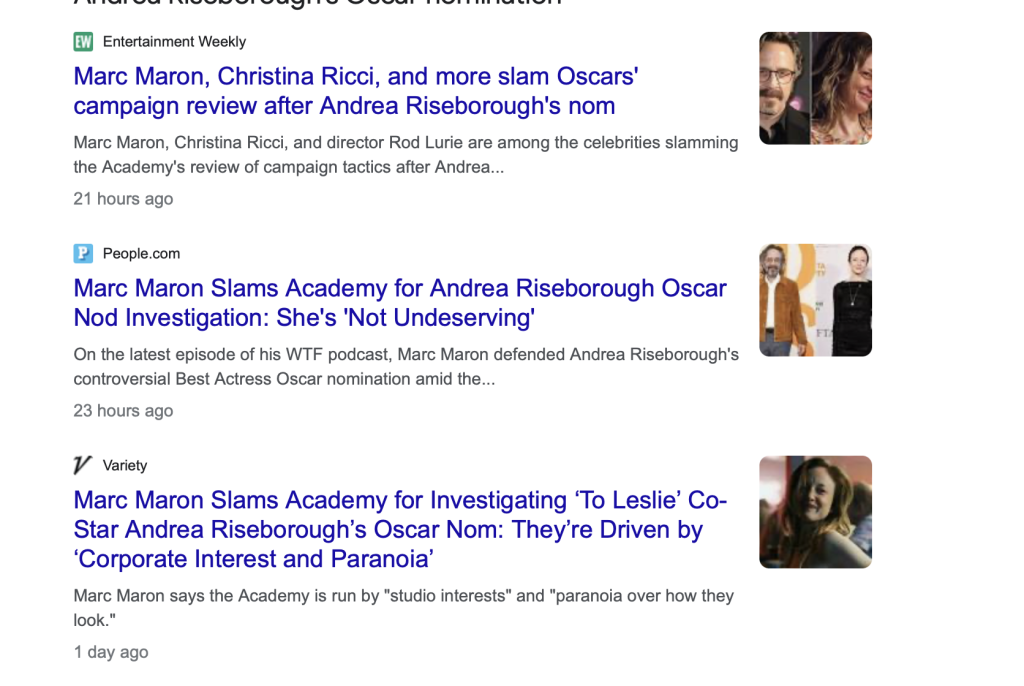“It was the best of times, it was the worst of times, it was the age of wisdom, it was the age of foolishness, it was the epoch of belief, it was the epoch of incredulity, it was the season of Light, it was the season of Darkness, it was the spring of hope, it was the winter of despair, we had everything before us, we had nothing before us, we were all going direct to Heaven, we were all going direct the other way–in short, the period was so far like the present period that some of its noisiest authorities insist on its being received, for good or for evil, in the superlative degree of comparison only.” — Charles Dickens, A Tale of Two Cities (1859)
A tale of two Hollywoods and two Americas with the Academy stuck in between. On one side — activists pushing for changes that have upended the entire industry and the Oscar race. Some for the better, some for the worse. On the other side — the industry itself that has to reach out to the broader majority to be profitable. These two things don’t seem able to co-exist, at least not how they’ve ended up.
It isn’t unusual to see the industry rally around a film or a contender they feel strongly about, especially if they think that this person isn’t getting the kind of money or publicity that it usually takes to mount a full-blown Oscar campaign. But it did seem unusual in how supporters of Andrea Riseborough went about it. That required the Academy take a closer look.
Bill Kramer at the Academy did exactly the right thing in looking into what just happened, how it happened, and whether that is going to be the new normal.
Per the Academy, from The Wrap:
Based on concerns that surfaced last week around the TO LESLIE awards campaign, the Academy began a review into the film’s campaigning tactics. The Academy has determined the activity in question does not rise to the level that the film’s nomination should be rescinded. However, we did discover social media and outreach campaigning tactics that caused concern. These tactics are being addressed with the responsible parties directly.
The purpose of the Academy’s campaign regulations is to ensure a fair and ethical awards process—these are core values of the Academy. Given this review, it is apparent that components of the regulations must be clarified to help create a better framework for respectful, inclusive, and unbiased campaigning. These changes will be made after this awards cycle and will be shared with our membership. The Academy strives to create an environment where votes are based solely on the artistic and technical merits of the eligible films and achievements.
They were never going to rescind Andrea Riseborough’s nomination. That was, sad to say, fake news. It’s weird to watch a story take off like it sometimes does on social media until it becomes a full blown media narrative. There isn’t any way to stop it because social media seems to have been designed just to give people a podium to bloviate their outraged stance.
Someone says it then another person amplifies it and it just keep snowballing. This one got so big it sprouted legs and started walking across the room, a completely mutated version of its former self. You know, like this:
It started out as a kind of funny story. Like, they’re doing WHAT? They’re saying WHAT PERFORMANCE was the best of the year? Then people were imagining maybe Andrea Riseborough’s “grassroots” campaign would actually produce enough votes to secure her place as the fifth slot, per Frances Fisher’s grand plan. The whole timeline is reported hilariously here.
The filmmaker, the filmmaker’s wife, and wait, Frances Fisher somehow involved? It just kept getting weirder, the more of it that came out. It was extraordinary and unprecedented, the scope of it. Was there something else or worse going on that wasn’t being disclosed? Did someone have a life-threatening illness and this was a kind of a moment to pull out the stops to get someone in? What was the urgency?
Some did it with screenings (which is very much standard procedure when it comes to Oscar campaigns). But some did it with social media, like Gwyneth Paltrow and Demi Moore, Kate Winslet, Mira Sorvino, and on and on it goes. Alison Janney is a co-star in the film and, needless to say, she’s well-connected.
Most of us just sort of wrote it off as interesting but not anything that was going to upend the Oscar race too much. After all, there were other contenders in line for the nomination if any of the five dropped out. We knew there were some names that were on the bubble. But by nomination morning it felt like Riseborough had skipped the line. It’s just not something we see everyday, that level of involvement. I still haven’t gotten an adequate answer as to why so many went to bat for her and the movie.
But of course gaming the system if you don’t know what you’re doing can produce unintended results, which is exactly what happened here. So after all that — after all of the protests in 2020, after BAFTA put its own members in a racist timeout and brought in a select committee to hand pick the nominees in the acting and directing categories, after the DEI mandates across all institutions of power, after Nomadland and CODA and thousands of activists trying to make real change — two Black women playing two strong female leaders in films written, produced, and directed by Black women were shut out of the race.
But of course, the story then grew a third head when it awakened a sleeping giant. Somehow the idea that the Academy was going to look into the nomination enraged enough people that they started freaking out loudly online. Again, I wondered, what gives? Why is all of this so personal? Does someone involved have like a month to live and we just don’t know about it? If so, please let us know so we don’t make it worse. But if it was just a way to game the system — well, then they have to rethink the rules a bit to make it fair for everyone who doesn’t have as many friends in high places.
Riseborough has now become some kind of martyr for the cause. The false media narrative that it was some kind of “investigation” that was going to take away her Oscar nomination brought the 1960s back from the long buried loins of many.
Marc Maron got angry at the Academy and the insults began to fly:
That “paranoia of how they look” from Maron seems to indicate that he believes the Academy is worried about appearing to be racists after all of their efforts over the past decade? Is that what he means? Is Riseborough now some “anti-woke” symbol for those who can’t take on the fight directly but can stand up here where it’s safer by making the Academy, and not the activists, the problem?
Did this whole thing uncork pent up rage from people who feel like things have gone too far and Hollywood has been trying too hard to make things fair and equitable for marginalized groups? It appears that Jeff Wells believes exactly that, as he wrote a piece today called “There’s Something Happening Here.”
I was just as surprised by the Andrea Riseborough thing as anyone else, but to paraphrase Stephen Stills, “There’s something happening here.” Paul Schrader, Marc Maron, Rod Lurie…something has snapped.
The Academy of Motion Picture Arts & Sciences is just trying to placate the Riseborough conversation — we all understand that, no worries — but there’s an early groundswell thing happening regardless. Right here, right now.
What we’re all witnessing or at least sensing is the very early beginnings of the end of woke tyranny.
I am the groundhog — Hollywood Elsewhere is the groundhog.
Obviously the Riseborough thing (which is partially driven by the “hey, what happened to Danielle Deadwyler?” thing) and the climate of fear within film festivals are separate concerns. But they’re also linked in a certain oblique way.
As Jeff knows, I vehemently disagree with his assessment about THIS moment. What he’s sort of suggesting is that it shouldn’t matter to people that Viola Davis and Danielle Deadwyler were both dropped, that it doesn’t matter that only one Black actress has ever won in 95 years of Oscar history, or that Davis didn’t win the SAG twice only to lose it to a white actress winning her THIRD Oscar. None of that should matter because it’s time to get on with it.
Presumably that’s assuming Riseborough wasn’t “in the conversation” because Black women were in her way. Nope. Sorry. Not true. She had ZERO buzz. Her buzz was 100% manufactured. If those actresses dropped out, the nomination might have gone to, say, Emma Thompson or Olivia Colman or Margot Robbie. No amount of millions could have gotten her the nomination without buzz. She could have spent $20 million on an ad campaign and it would not have done what this campaign did to get her a nomination.
So why are these guys so angry? Perhaps it’s because they finally have a way to get mad where they won’t be accused of anything by anyone. They’re sticking it to the man! Because they couldn’t complain about what has happened in this industry, because they can’t say “why can’t it just be about the performance” and because there has been a shutting out of white men from almost all areas in Hollywood — because they can’t scream about that, they’re going to scream about this.
It reminded me of Walt Whitman:
I too am not a bit tamed, I too am untranslatable,
I sound my barbaric yawp over the roofs of the world.
These guys, silent all these years, were no longer watching from the sidelines — they were tweeting and Facebooking and giving out this or that statement as though this was now some kind of moral stand they had to take. You know, like Ed Harris and Amy Madigan not standing up for Elia Kazan?
But I have to wonder, why have they been so silent all this time? Why haven’t they taken a stand? Where were the Academy members making phone calls to help get Meg Smaker a nomination for her film that was shamefully canceled out of Sundance?
She tried to get it screened and get people talking and didn’t have the money to get her film pushed. Here is Sharon Waxman 11 months ago talking with her.
And then…the whole thing blew up. There was a climate of fear around it. She was shamed out of Sundance and before long, everyone turned their back on her.
Here is Sebastian Junger:
Essentially, this was unbelievably unfair [the maligning of Smaker’s film], and there was so much cowardice on the part of powerful people. I was just, wow, what a coming together of ghastly things, vengeful, petty malicious people who don’t really have a case, and fearful powerful people looking to protect themselves. It’s grotesque.”
She mostly made the rounds in the heterodox community in an effort to drive buzz for an Oscar nomination, hitting Megyn Kelly:
To her credit, Sharon Waxman did interview Smaker in November in hopes of raising her profile to get her an Oscar nomination.
So I’m only going to say this once, but I hope the message gets out loud and clear to those puffed up angry barbaric yawps now taking a stand: WHERE WERE YOU?
The Academy did nothing wrong. It isn’t easy to be in their place as they head into their 100th year and seem to have almost everyone rooting for their demise.
They are caught between two worlds, two cities. No outcome for the Riseborough story would have satisfied everybody. It isn’t their job to fix society or even the film industry. They don’t deserve an onslaught of vitriol from Marc Maron. If they want to criticize the Oscar race, the money spent on ads or the constant campaigning — the dog and pony show — done for months, leave the Academy out of it.
But I don’t want to hear it from people who are pretending like they’re taking some brave stand against “the establishment” if all they do is complain about the Academy. That’s the lowest hanging fruit. Get back to me when you exhibit real courage amid the kind of climate of fear we’re living through.











![2025 Oscars: Can a Late-Breaker Still Win Best Picture? [POLL]](https://www.awardsdaily.com/wp-content/uploads/2024/10/gladiator-350x250.jpg)
